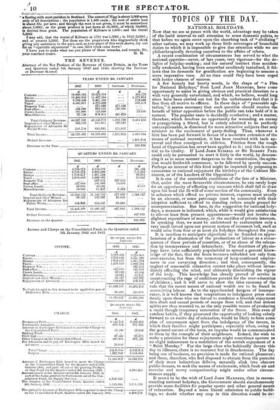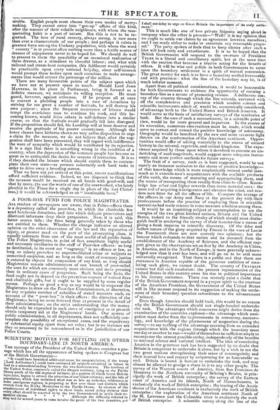TOPICS OF THE DAY.
NATIONAL HOLYDAYS.
Now that we are at peace with the world, advantage may be taken of the lucid interval to call attention to some domestic points, so that before we again enter upon the absorbing task of " civilizing " other nations, we may work up those little enwraps of household duties to which it is impossible to give due attention while we are philanthropically devoting ourselves to the affairs of others. A recent combination of circumstances has served to whet the national appetite-never, of late years, very vigorous-for the de- lights of holyday-making; and the natural instinct thus acciden- tally awakened, having been somewhat needlessly tantalized, it fol- lows that its demands for gratification are beginning to assume a more imperative tone. At no time could they have been urged with better chances of success.
A few homely but hearty words, in the shape of " a Plea for National Holydays," from Lord Joint ISilAnziees, have come
opportunely to assist in giving obvious and practical direction to a
wish very generally entertained, and which, we believe, would long since have been carried out but for the unfortunate fact that it is
free from all motive to offence. In these days of " peaceable agi- tation," it seems necessary that each question should receive the benefit of bitter opposition before the public can take hold of it in earnest. The popular taste is decidedly combative ; and a matter, therefore, which involves no opportunity for wounding an enemy or panegyrizing a friend, but is calmly admitted to be perfectly unexceptionable, is dismissed for more attractive subjects that may minister to the excitement of party-feeling. Thus, whenever a hint has been put forward in favour of a moderate extension of the means of national recreation, it has been received with tacit ap- proval and then consigned to oblivion. Friction from the rough hand of Opposition has never been applied to it ; and this is essen- tial to its vitality. If Lord JOHN RUSSELL or Sir ROBERT PEEL could only be persuaded to start it fairly in the world, by denoun- cing it as in some manner dangerous to the constitution, the agita-
tion would forthwith commence, to be followed by speedy success. Perhaps an interest of this kind might be imparted by proposing to consecrate to national enjoyment the birthdays of the Cabinet Mi- nisters, or of the Leaders of the Opposition ?
It is one of the unenviable conditions of the fate of a Minister, that, under the most favourable circumstances, he can rarely hope for an opportunity of effecting any measure which shall fail to draw upon his head the of some section of the community. Even in schemes which offend no private interest, expense must usually be an element, or some patronage must be connected with their adoption sufficient to afford to standing railers ample ground for misrepresentation. But here, in the suggestion for nationalloly- days, a measure is indicated, which, while it would give satisfaction to all-at least from present appearances--would not involve the slightest expenditure of money, or the sacrifice of private interests. In speaking thus, we must be understood to contemplate only a very small inroad upon our present system of incessant toil, such as would arise from four or at most six holydays throughout the year.
It is needless to anticipate objections to be founded on appre- hensions of a diminution of the productions of labour as a conse- quence of these periods of cessation, or of an abuse of the relaxa- tion by intemperance and debauchery. The doctrines of physio- logy have been sufficiently popularized to spread .a general know- ledge of the fact, that the brain becomes enfeebled not only from over-exercise, but from the monotony of long-continued employ- ment in one unvarying direction ; and that, consequently, the neglect of seasonable relaxation cannot take place without imme- diately affecting the mind, and ultimately diminishing the vigour of the body. This knowledge has already proved of service in counteracting the rage of ambitious parents for the over-education of children; it will serve to show the false economy of the rule that the surest means of national wealth are to be found in unremitting labour. As to the apprehended dangers of intempe- rance, it is well known that temptations to indulgence press most fatally upon those who are forced to condense a feverish enjoyment into short and casual periods of escape from toil, and that ardent spirits are thus resorted to, as the only possible means of producing a rapid though temporary renovation of the frame. Men even of careless habits, if they possessed the opportunity of looking calmly forward to an entire day of relaxation, would be likely to form some plan of amusement apart from the indulgence of the tavern, in which their families might participate ; especially when, owing to the general nature of the boon, an impulse would be communicated to them by the example of their neighbours. Indeed, the wish to make a provision for these enjoyments might sometimes operate as no slight inducement to a restriction of the sottish enjoyment of a " Saint Monday." For the large class who habitually devote this day to idleness, there is no resource but in drunkenness. The day being one of business, no provision is made for rational pleasures ; and those, therefore, who feel disposed to abstain from the pursuits of their more industrious fellows, naturally slink into obscure public-houses, to seek the means of excitement, which fresh air and exercise and merry companionship might under other circum- stances supply.
It seems to kle the wish of Lord JOHN MANNERS, that in recom- mending national holydays, the Government should simultaneously provide some facilities for popular sports and other general means of relaxation. Beyond a more liberal admission to public build- ings, we doubt whether any step in this direction would be,de- sirable. English people must choose their own modes of merry- making. They cannot enter into "got-up" affairs of this kind, after the manner of their volatile neighbours, with whom the mas- querading habit is a part of nature. But this is not to be re- gretted. The love of rural scenery, always strong, is now more than ever a characteristic of our people ; and perhaps it exists in greatest force among the Cockney population, with whom the word " country " is at present often nothing more than a fertile source of dreams of enjoyments never to be hoped for. We should do well to present to them the possibility of an occasional realization of these dreams, as a stimulant to cheerful labour ; and, what with railroad and steam-boat companies, this fulfilment would certainly be practicable upon every national holyday, since self-interest would prompt these bodies upon such occasions to make arrange. ments that would attract the patronage of the million.
There are many favourable points of the subject upon which we have not at present space to touch. Should Lord JOHN MANNERS, in his place in Parliament, bring it forward as a definite measure, we anticipate its willing reception. He must guard, however, against extremes. If he propose all at once to convert a plodding people into a race of Arcadians by striving for too great a number of festivals, he will destroy his own purpose ; since the frequent recurrence of leisure would tempt the avaricious man to continue his work, and this be- coming known, would drive others in self-defence into a similar course, so that the festivals would gradually fall into disregard. If the proposition should fail, his Lordship will at least deserve and receive the gratitude of his poorer countrymen. Although the lower classes have hitherto shown no very active disposition to urge a claim for the measure, we do not believe that, after the sug- gestion shall have been presented, they will regard with indifference the want of sympathy which would be manifested by its rejection. It is a sign that there is something wrong in the condition of a country, when the depression of the common people has become so great as to extinguish the desire for seasons of recreation. It is as if they dreaded the leisure which should enable them to contem- plate their own state—as persons voluntarily seek hard tasks in order to drive away a brooding sorrow.
That we have not yet arrived at this point, recent manifestations afford sufficient evidence. Indeed, we are disposed to think that the measure would be received on all hands with good-will, and that by many, (to use the words of one of the overworked, who lately pleaded in the Times for a single day in place of the lost Christ- mas,) it would be acknowledged as an " inestimable boon."































 Previous page
Previous page